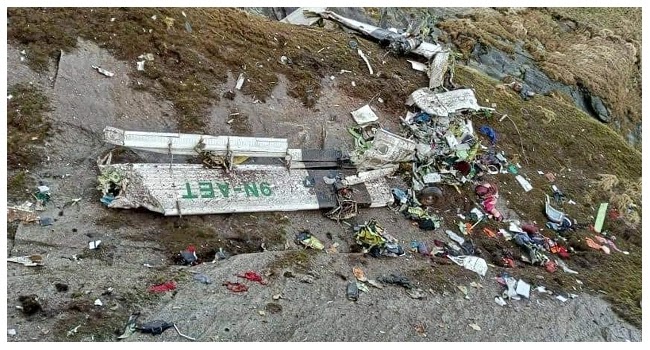 |
| The wreckage of a Twin Otter aircraft, operated by Nepali carrier Tara Air, lay on a mountainside in Mustang on May 30, 2022, a day after it crashed. BISHAL MAGAR / AFP |
Nepali rescuers on Monday retrieved 16 bodies from the mangled wreckage of a passenger plane strewn across a mountainside that crashed in the Himalayas with 22 people on board.
Air traffic control lost contact with the Twin Otter aircraft operated by Nepali carrier Tara Air shortly after taking off from Pokhara in western Nepal on Sunday morning headed for Jomsom, a popular trekking destination.
Helicopters operated by the military and private firms braved poor weather to scour the remote mountainous area all day Sunday, aided by teams on foot, but called off the fruitless search when night fell.
After resuming on Monday, the army shared on social media a photo of aircraft parts and other debris littering a sheer mountainside, including a wing with the registration number 9N-AET clearly visible.
“So far, 16 bodies have been recovered and teams are searching for the remaining six. Chances of survival are low but our efforts continue to find them,” Civil Aviation Authority spokesman Deo Chandra Lal Karn told AFP.
There were about 60 people working at the crash site, including army, police, mountain guides and locals, most of whom trekked for miles on foot to get there.
The authority said that the plane “met an accident” at 14,500 feet (4,420 metres) in the Sanosware area of Thasang municipality in Mustang district.
“Analysing the pictures we received, it seems that the flight did not catch fire. Everything is scattered on the site. The flight seems to have collided with a big rock on the hill,” said Pokhara Airport spokesman Dev Raj Subedi.
Families
Four Indians were on board, as well as two Germans, with the remainder Nepalis including a computer engineer, his wife and their two daughters who had just returned from the United States.
The four Indians were a divorced couple and their daughter and son, aged 15 and 22, going on a family holiday, Indian police official Uttam Sonawane told AFP.
“There was a court order for (the father) to spend time with the family for 10 days every year, so they were taking a trip,” Sonawane said.
Pradeep Gauchan, a local official, said that the wreckage was difficult to reach and that poor weather was hampering the operation.
“One team has been dropped close to the area by a helicopter but it is cloudy right now so flights have not been possible,” Gauchan told AFP earlier in the day.
“Helicopters are on standby waiting for the clouds to clear,” he said.
According to the Aviation Safety Network website, the aircraft was made by Canada’s de Havilland and made its first flight more than 40 years ago in 1979.
Past crashes
Tara Air is a subsidiary of Yeti Airlines, a privately owned domestic carrier that services many remote destinations across Nepal.
It suffered its last fatal accident in 2016 on the same route when a plane with 23 onboard crashed into a mountainside in Myagdi district.
Nepal’s air industry has boomed in recent years, carrying goods and people between hard-to-reach areas as well as foreign trekkers and climbers.
But it has long been plagued by poor safety due to insufficient training and maintenance.
The European Union has banned all Nepali airlines from its airspace over safety concerns.
The Himalayan country also has some of the world’s most remote and tricky runways, flanked by snow-capped peaks with approaches that pose a challenge even for accomplished pilots.
The weather can also change quickly in the mountains, creating treacherous flying conditions.
In March 2018, a US-Bangla Airlines plane crash-landed near Kathmandu’s notoriously difficult international airport, killing 51 people and seriously injuring 20.
That accident was Nepal’s deadliest since 1992 when all 167 people aboard a Pakistan International Airlines plane died when it crashed on approach to Kathmandu airport.
Just two months earlier a Thai Airways aircraft had crashed near the same airport, killing 113 people.


